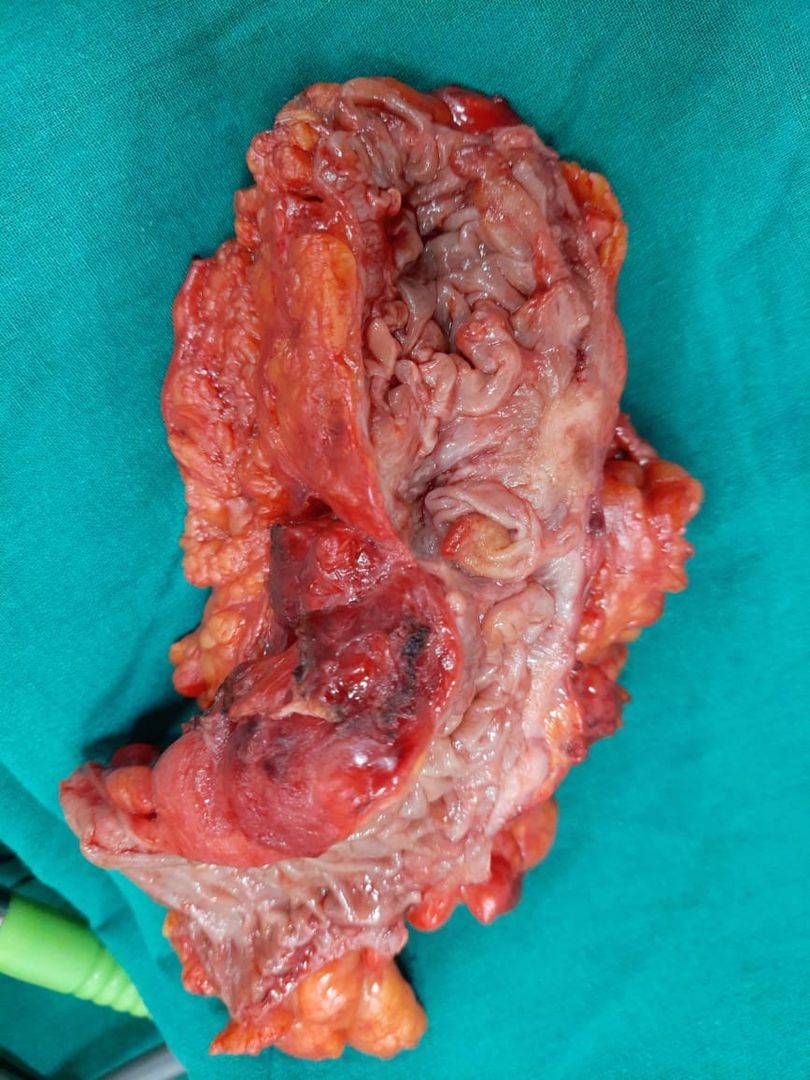- 079041 39064 Call Us Now
- gastrosamrat@gmail.com Email Us
- Home
- About
- Colorectal Surgery
- Laparoscopy
- GI Cancer Surgery
- Case Study
- Patients Corner
- Blogs
- Contact Us
Chronic Diverticulitis

Details of the Patient
- Patient’s Name: Anonymous
- Patient’s Age: 43
- Patient’s Gender: female
Symptoms shown by the Patient
- History of lower abdominal pain for 2 days
- History of abdominal distention for 2 days
- Not passing stool for 2 days
An Overview of the Case
A 43 year old female came with diagnosed case of chronic diverticulitis. She was on medication for last 2 years. Upon examination, abdomen distended with tympanic note all over abdomen. After thorough evaluation she underwent laparoscopic sigmoidectomy with 5 small cuts over abdomen. The operation time was 4 hours with a blood loss of 200 ml. She was hospitalized for 6 days, later discharged with normal life style and tolerating normal food.
Diverticulosis is a condition in which there are small pouches or pockets in the wall or lining of any portion of the digestive tract. These pockets occur when the inner layer of the digestive tract pushes through weak spots in the outer layer. Diverticulitis occurs when the pouches become infected or inflamed. This condition usually produces localized abdominal pain, tenderness to touch and fever. A person with diverticulitis may also experience nausea, vomiting, shaking, chills or constipation. Minor cases of infection are usually treated with oral antibiotics and do not require admission to the hospital. Repeated attacks of diverticulitis may require surgery to remove the affected portion of the colon.
Medical Tests Performed
Guidelines Provided after Treatment
Relevant Questions
Q. What are the symptoms of Gastroesophageal reflux disease (GERD)?
Acid reflux is the most common symptom of GERD. Acid reflux can produce a burning sensation in your chest that spreads up into your neck and throat. Heartburn is a common name for this sensation.
You may get a sour or bitter taste in the back of your mouth if you have acid reflux. It may also cause food or liquid to regurgitate from your stomach into your mouth. Some other symptoms of GERD include:
- Nausea & Chest pain
- Pain when swallowing or may be difficulty in
- swallowing
- Chronic cough
- a hoarse voice
Q. My grandfather was diagnosed with GERD, how can he be treated?
GERD is a digestive disorder that affects the ring of muscle between your oesophagus & your stomach. This can usually be controlled with medication. If you wish to avoid long-term medication then we recommend: Fundoplication. Plan a consultation with Dr Samrat Jankar, our expert gastroenterologist. He will provide the best possible & effective treatment for this.
Q. What are the symptoms of colon cancer?
Colon cancer is also known as colorectal cancer, a term that combines colon cancer with rectal cancer, which starts in the rectum. The following are some of the signs and symptoms of colon cancer:
- A change in your bowel habits, such as diarrhoea or constipation, or a change in the consistency of your stool, that persists.
- Blood in your stool or rectal bleeding.
- Consistent stomach pain, such as cramps or gas.
- Unexplained weight loss
Weakness or exhaustion.
Q. My brother has sleep apnea most probably due to his obesity, how can that be treated?
For milder cases of obstructive sleep apnea, we recommend some lifestyle changes. Such as,
- Lose weight if you’re overweight.
- Exercise regularly.
Use a nasal decongestant or allergy medications. - Don’t sleep on your back.
- Avoid taking sedative medications such as anti-anxiety drugs or sleeping pills.
Q. What is incarcerated hernia?
A section of the intestine or abdominal tissue that becomes trapped in the sac of a hernia—the bulge of soft tissue that pushes through a weak place in the abdominal wall—is known as an incarcerated hernia. Stool may not be able to pass through the intestine if a section of it is trapped.
Incarcerated inguinal hernias usually cause swelling in the groin region, and some may show redness. If bowel obstruction has occurred, some additional symptoms may include sudden onset of pain, lack of appetite, irritability, and nausea or vomiting.
Book an Appointment
Enter details, our team would approach you to help you as soon as possible.
